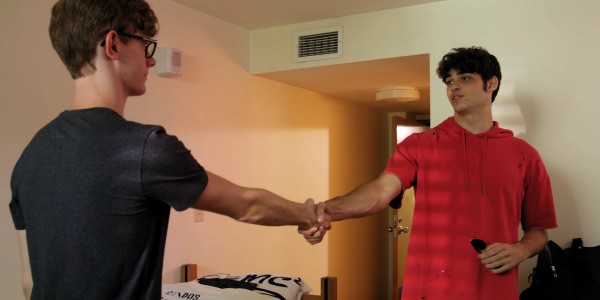Ann Deborah Fishman’s Swiped is a satire focused on modern dating, which focuses on college freshman James (Kendall Ryan Sanders) as he develops a hook-up app with his womanizing roommate Lance (Noah Centineo) and a group of like-minded college guys.
Satirical Theme Falls to the Background
Swiped does come across as a satire in some moments, but not often enough to make those moments land. Too many times in the film, I felt the characters upon which the film was focusing its satire were both one-dimensional and written to be redeemed.

If the characters were more developed, the redemption could work for the film. While watching Swiped, I felt it was an interesting choice to not have the entire film focused on the redemption of Lance and his friends Daniel (Nathan Gamble) and Wesley (Christian Hutcherson), but the film also felt like we were supposed to enjoy seeing these characters represent their sexist ideals and not see them as the satirical representations of those backwards values.
When the film redeems Lance in its final scene, I felt some of the satire against men treating women like objects was washed away, so we could have a guy winning a girl he had been treating like shit through the entire film.
Misguided Satire Comes Across Poorly for Women
Some of the satirical aspects of the film deal with women realizing their potential and power, but only through the help of a man. This comes across as misguided because it works as the climax of the story for the main character James. This aspect of the film is not told in a particularly funny or over-the-top way, other than maybe one moment where a woman specifically says that this man will teach them how to take back their power against dating apps and men.
Having a romance between James and Hannah (Shelby Wulfert), one of the women he is supposedly helping, also makes this aspect feel like it is supposed to be taken seriously as a solution for the women in the film.
I can see how the script for Swiped could seem like a good step for women, making these double standards and poor treatment known, but the film comes across in a more serious way than it was probably intended. This film could easily attract an audience that does not look beneath the surface of its characters, but it could also feel relatable and familiar to women who are treated like this by the men in their life.
Some moments were humorous, but in the end, I was not laughing at women being treated in an only slightly exaggerated way of what I see in life. With the ending highlighting the romance, I could not appreciate the satire of looking down upon men using an app that focuses on treating women as nameless objects who cannot contact you after a hookup.
A Decent Look at Double Standards in Dating
The narrative of Swiped is resolved by a male savior, who also happened to create the problem. This aspect of the film works well, and is a nice way to show the way men and women are looked at differently. When the app is created, the men decide all the women will join if it is the only place to find guys. Even if the men are terrible to them, this is the only option.
This is repeated back with James’s mother, who says she just has to get used to the new dating scene after having a terrible experience, but with his father, he easily finds a new younger girlfriend through the app. Near the end of the film, James tells the women that if they delete their apps, the men will have to follow. In addition to being an extremely heteronormative narrative, this also shows that James is just offering the same speech the other men gave him, and is not giving the women anything new in his teaching them how to take back their power.
This aspect of the film works better than the other moments of satire, but the film still paints a black and white world where James is the only man who doesn’t just want sex and Hannah is the only woman who wants something deeper, until James teaches the other women that this is what women are supposed to want.
Swiped: Conclusion
Swiped is a satire that misses the mark, and comes across as a rather dated look at relationships and the differences between men and women. With its entirely heterosexual focused story lines, Swiped falls flat in both the satire and the romance departments. I can see the potential in Ann Deborah Fishman’s film, but the satire, which feels present in the characters and script, does not come through in the final product.
Do you think dating apps have negatively impacted relationships? Did Swiped accurately represent the modern dating culture of hook-up and dating apps? Please share your thoughts in the comments.
Watch Swiped
Does content like this matter to you?
Become a Member and support film journalism. Unlock access to all of Film Inquiry`s great articles. Join a community of like-minded readers who are passionate about cinema - get access to our private members Network, give back to independent filmmakers, and more.